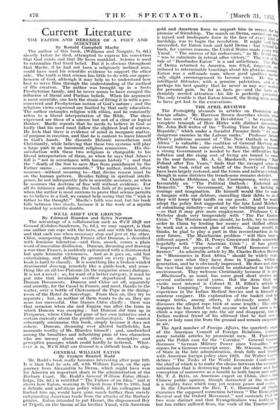THE APRIL REVIEWS
The Fortnightly abounds in articles on Dominion foreign affairs. Mr. Harrison Brown describes vividly whit he has seen of " Germany in Revolution " ; he regards tht complete triumph of Herr Hitler with distinct uneasiness. Mr. John Bell writes of the " Testing Time for the Spanisk Republic," which under a Socialist Premier finds " its mot dangerous enemies in the Labour ranks." Professor Arnnld Plant's judicious account of " The New Outlook in So Africa " is valuable ; the coalition of General Hertzog General Smuts has come about,' he thinks, largely becaust • a -strong Government is needed to face the difficulties that inflation and,the rising cost of living are bound to caul1 in the near future. Mr. A. G. Macdonell, revisiting Ealt Potand after Ten Years," finds that the ravaged areas to which he took relief on behalf of the Society of Friends have been largely restored, and the towns and railways rebuilt though in some districts the trench-zone remains derelict. '
Sir Charles Hobhouse, in the Contemporary, writes very favourably on " The Political Outlook : External and Doniestic: - The Government, he thinks, is lacking it courage and imagination. He himself would -like to make a bargain with our .debtors cancelling their debts to us if they will lower -their tariffs on our goods. And he would adopt the policy first suggested by the late Lord Melehett, of subsidising industry—or at any rate building and farming —so that it may give more employment. Professor C. K. Webster deals very temperately with " The Far Flora Crisis." The Western nations should, he holds, try to restore order in China by lending her money and skilled officials to work out a coherent plan of reform. Japan would, he thinks, be glad to play a part in this reconstruction in the near future. The Manchurian problem " will then bear a different aspect." Mr. H. Powys Greenwood deals somewhat hopefully with " The American Crisis " • it has great) " improved the prospects of the World Economic Con• ference." An admirable article by Mr. Charles Roden Buxton on " Missionaries in East Africa " should be widely read; he has seen what they have done in Uganda, within a generation, and he is obviously impressed. He does not share the view that the natives should be undisturbed in their old environment. They welcome Christianity because it is not Black-wood's, as usual, has some good short stories and several authentic naval yarns. But the item that will excite most interest is Colonel R. H. Elliot's article on " Indian Conjuring," because the author has had long experience in the Indian Medical Service and is himself as amateur conjurer. His explanation of the basket and the mango tricks, among others, is obviously sound. He discusses-the alleged rope trick at some length ; like other inquirers he has failed to find anyone who had seen a toy climb a rope thrown up into the air and disappear, but an Indian medical friend of his affirmed that he had seen a Guru or holy man rise from the ground and remain suspended in air."
The Aprilnumber of Foreign Affairs, the quarterly organ of the American Council of Foreign Relations, contaim many notable articles by prominent men. M. Paderewslit puts the Polish case for the " Corridor." General Groener discusses " German Military Power since Versailles " and argues for a German conscript army. Mr. Stimson, Secretary of State in the late administration, deals fully and frankly with American foreign policy since 1929. Sir Walter Layton, defines " The Tasks of the World Economic Conference. the chief of which is to make the choice-between-the economic nationalism that is destroying trade and the older and fief/ conception of commerce as a benefit to both buyer and seller. Mr. T. J. Betts, an American expert on China, shows that Chinese public opinion, though distracted at the moment, is a mighty force which may yet restore peace and order.
In the Churchman the Rev. T. C. Hammond of Dublin examines the supposed connexion between " The Evangelici Revival and the Oxford Movement," and contends that tIr two were distinct and that Evangelicalism was nothing to but has rather suffered from, the work of the Tractarians.








































 Previous page
Previous page